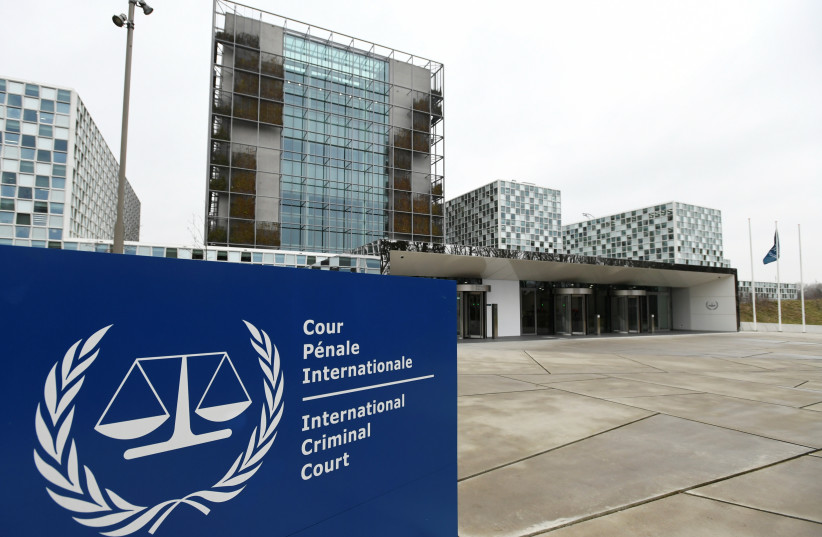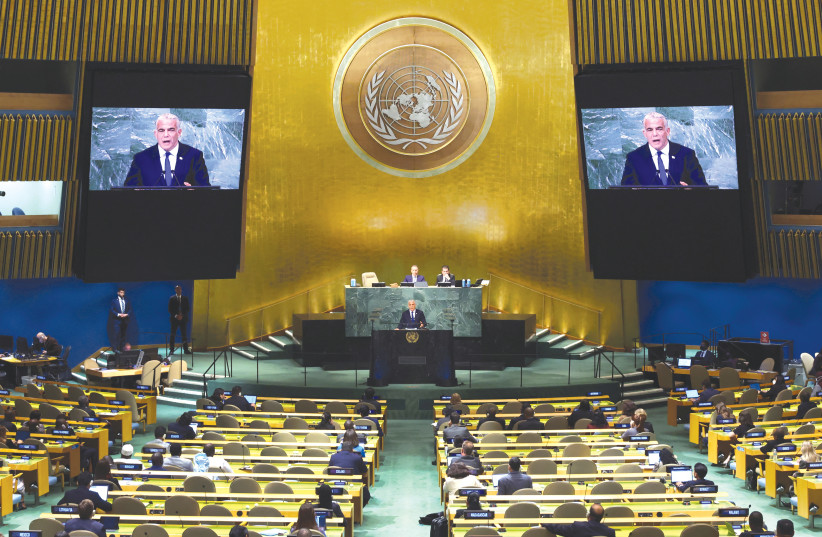The Palestinian attempt to bring the status of disputed territories to international tribunes is meant to delegitimize Israel, Prime Minister Yair Lapid wrote in a letter to more than 50 world leaders on Monday, asking them to stop a UN General Assembly vote on the matter.
The UNGA’s Fourth Committee voted 98-17 earlier this month to ask the International Court of Justice to consider whether the IDF’s ongoing presence in Judea and Samaria, east Jerusalem and the Golan Heights can be considered de facto annexation after 56 years. The resolution questions the status of Jerusalem and ignores Jewish ties to its holiest site, the Temple Mount, referring to it only as al-Haram al-Sharif (the Noble Sanctuary).
“[The] resolution is the outcome of a concerted effort to single out Israel, to discredit our legitimate security concerns, and to delegitimize our very existence."
Prime Minister Yair Lapid
The resolution must be approved in another full General Assembly vote, which Lapid seeks to prevent, before the question goes to The Hague.
Efforts to prevent a full UNGA vote
The “resolution is the outcome of a concerted effort to single out Israel, to discredit our legitimate security concerns and to delegitimize our very existence,” Lapid said.
“It has long been accepted that the status of disputed territory will be subject to direct negotiations between Israel and the Palestinians,” he wrote. “A one-sided change to such a policy will have detrimental effects on the entire region. Bringing the matter before the ICJ expressly contravenes the principle of direct negotiations accepted by Israel, the Palestinians and the international community, and will only play into the hands of extremists, further polarize the parties, and undermine the positive work that has been done over the past few years.”

Lapid said his government has “promoted high-level contacts with the Palestinian Authority and has undertaken numerous confidence-building measures on the ground to promote the prosperity and well-being of the Palestinians.”
Lapid called on world leaders to exert their influence on the PA to not bring the resolution to a final vote, but failing that, he said he expects Israel’s friends to vote against it.
The Prime Minister’s Office sent the letter to leaders from the UK, France, Croatia, Romania, Bulgaria, the Netherlands, Slovakia, Latvia, Georgia, Brazil, Uruguay, Peru, Vietnam and other countries.
How can Israel's government respond?
Following the vote nearly three weeks ago, Lapid instructed the government to prepare a “security and diplomatic toolbox” to respond.
“The way to resolve the conflict does not pass through the halls of the UN or other international bodies, and the Palestinians’ move at the UN will have consequences.”
Israeli Prime Minister Yair Lapid
“The way to resolve the conflict does not pass through the halls of the UN or other international bodies, and the Palestinians’ move at the UN will have consequences,” he said.

Many European countries abstained from the vote, including Bulgaria, Croatia, Cyprus, Denmark, Finland, France, Greece, Latvia, Lichtenstein, the Netherlands, Norway, Romania, Slovakia, Spain, Sweden, Switzerland and the UK.
Israel, the US, Canada and Australia were among the nations that opposed the ICJ referral, as well as Austria, Bulgaria, the Czech Republic, Estonia, Germany, Guatemala, Hungary, Italy, Liberia, Lithuania, the Marshall Islands, Micronesia, Nauru and Palau.
US Secretary of State Antony Blinken asked PA President Mahmoud Abbas not to put the resolution to a vote and lobbied like-minded countries to oppose it.
ICJ rulings are not binding, but a decision against Israel would help codify into international law the Palestinian insistence that all pre-1967 territory should be within the final boundaries of its future state.
